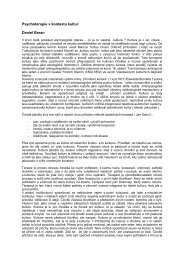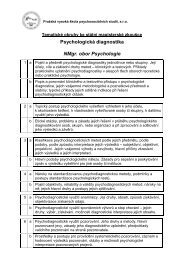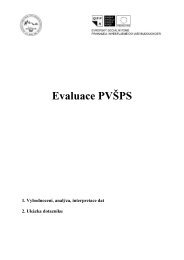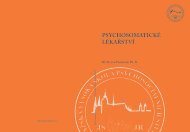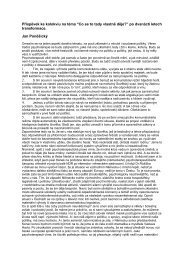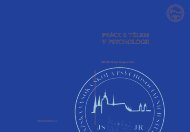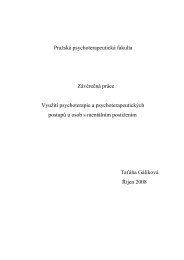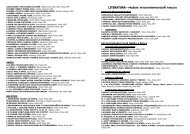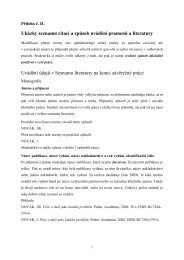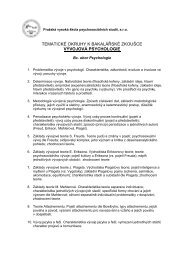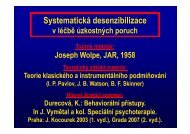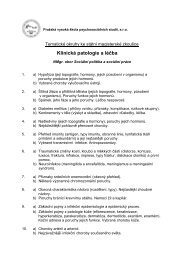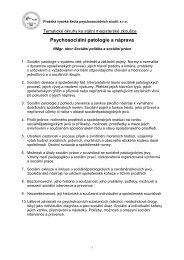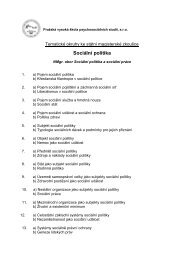New Sources of Fear in a Late Modern Society: The Globalization of ...
New Sources of Fear in a Late Modern Society: The Globalization of ...
New Sources of Fear in a Late Modern Society: The Globalization of ...
You also want an ePaper? Increase the reach of your titles
YUMPU automatically turns print PDFs into web optimized ePapers that Google loves.
108<br />
NEW SOURCES OF FEAR IN A LATE MODERN SOCIETY<br />
He also lists miscellaneous fears, to which, for example, he adds fears <strong>of</strong> accidents<br />
(drown<strong>in</strong>g, burn<strong>in</strong>g, that the cars would run <strong>of</strong>f the track, be<strong>in</strong>g killed by runaway<br />
horses, hurricanes, earthquakes), fears <strong>of</strong> f<strong>in</strong>ancial losses, <strong>of</strong> disesteem, <strong>of</strong> stand<strong>in</strong>g<br />
exam<strong>in</strong>ations and even moral and religious fears (Morse, 1907).<br />
Eighty years later, Gray (1987, p. 25) recommends that we “classify the stimuli<br />
for fear <strong>in</strong>to those which are distal and <strong>in</strong>tense; novel; characteristics <strong>of</strong> special<br />
evolutionary dangers; aris<strong>in</strong>g dur<strong>in</strong>g social <strong>in</strong>teraction with non-specifics; or<br />
conditioned by fear”.<br />
COPING WITH FEAR: AN INTRODUCTION<br />
<strong>The</strong> efforts <strong>of</strong> Man to manage his fears are as old as mank<strong>in</strong>d itself. However,<br />
ridd<strong>in</strong>g oneself <strong>of</strong> fear entirely has been proven to be both impossible and decidedly<br />
unnatural. <strong>The</strong> active search for security as a k<strong>in</strong>d <strong>of</strong> antithesis to fear is a basic component<br />
<strong>of</strong> human history as well as the history <strong>of</strong> the <strong>in</strong>dividual human. Riemann<br />
(2010) <strong>in</strong>troduces these strengths, which act aga<strong>in</strong>st fear and help to regulate them:<br />
courage, trust, resolution, strength, hope, humility, faith and love. <strong>The</strong> supernatural,<br />
religion and science also help, he suggests, manage and cope with fear.<br />
In a universal sense, it is possible to state that cop<strong>in</strong>g strategies primarily relate<br />
to anxiety and not fear. “If I don’t know what I am afraid <strong>of</strong>, I am experienc<strong>in</strong>g<br />
anxiety, not fear. But this does not permit to fix a clear boundary between fear and<br />
anxiety, because whereas fear necessarily concerns def<strong>in</strong>ite dangers, we do not<br />
assume that anxiety should always concern <strong>in</strong>def<strong>in</strong>ite dangers. It may be experienced<br />
even with def<strong>in</strong>ite dangers, that is, dangers which I know what they are, provided<br />
that they imply some uncerta<strong>in</strong>ty. Anxiety is <strong>in</strong> fact a response to uncerta<strong>in</strong>ty<br />
as regards either the outcome <strong>of</strong> events, or the action to be taken, or one’s power<br />
to foresee or to act upon reality, or one’s ability to bear <strong>in</strong>jury” (Miceli & Castelfranchi,<br />
2005, p. 295). If we are to dissect the <strong>in</strong>dividual causes <strong>of</strong> fear <strong>in</strong> the sense<br />
that we have discussed, to rid one’s own self <strong>of</strong> fear also means to rid oneself <strong>of</strong><br />
its causes. Thus, to rid oneself <strong>of</strong> the fear <strong>of</strong> an enemy means either to rid oneself<br />
<strong>of</strong> that enemy or to stop perceiv<strong>in</strong>g that person or as an enemy; to remove the fear<br />
<strong>of</strong> the unknown means to change that state <strong>in</strong>to someth<strong>in</strong>g more familiar etc. It is<br />
entirely natural to express fear over a flood, car accident or an exam, so long as<br />
those events have a direct potential impact on the person who fears them. Suppression<br />
and avoidance <strong>of</strong> threaten<strong>in</strong>g <strong>in</strong>formation tends to be expressed as a strategy<br />
for cop<strong>in</strong>g with fear. In order for a person to overcome their fears, he or she should<br />
be able to differentiate which fears represent a genu<strong>in</strong>e threat and which ones do<br />
not. At the same time, various natural factors and socio-cultural contexts, where a<br />
given <strong>in</strong>dividual lives, are also a key factor.



